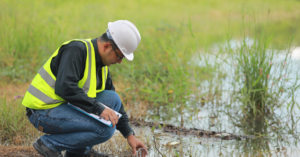 Recent university grads who studied environmental science, chemistry, and biology, listen up! There’s a way to break into a career in environmental sciences that you may have overlooked. In fact, there are lots of opportunities for entry-level science grad applicants to do hands-on field chemistry work across a variety of industries. And by taking this route, you’ll develop within the industry, get extensive training, and set yourself up for a rapid career growth trajectory.
Recent university grads who studied environmental science, chemistry, and biology, listen up! There’s a way to break into a career in environmental sciences that you may have overlooked. In fact, there are lots of opportunities for entry-level science grad applicants to do hands-on field chemistry work across a variety of industries. And by taking this route, you’ll develop within the industry, get extensive training, and set yourself up for a rapid career growth trajectory.
Here’s what you need to know about entry level environmental work as a field chemist.
It’s incredibly hands on and rewarding
Organizations – from colleges and universities, to hospitals, to laboratories and pharmaceutical companies – need knowledgeable workers who can facilitate the packing and discarding of used chemicals. Being a field chemist dealing with hazardous materials, you’ll need to learn how to deal with materials expired or leftover, how to categorize them (flammable, explosive, etc.), and how to make sure they are handled properly. Understanding chemistry and lab safety protocols is super important as the proper disposal of chemicals is essential not only for people’s safety, but the environment as well.
It’s a stepping stone
Environmental specialists, field chemists and other similar starting positions are geared toward science graduates coming out of four-year universities. Once you’re with a company, many outline a specific career path with a straight-line trajectory that allows you to increase your responsibilities and income every few months.
Typically you will begin as a Field Chemist, Level 1, and then get promoted to Level 2, followed by Level 3. As long as you complete your required training, these stages can happen every 3 to 6 months, and every next step comes with a pay raise. Within one year, it’s not unusual to earn two to three raises and have your per-hour pay rate increase by $4 or more.
After Level 3, you may then be able to advance into higher level roles like project manager, department manger, coordinator, etc.
It could be a good choice if you don’t want to do only lab research
Not all scientists want to spend their careers working in a lab. If you’re looking for more of a customer-facing role in which you get to do important environmental work out in the field, then this could be a good career fit for you. If you’re more of an extrovert, these jobs give you the chance to work with a diverse group of people out in the field.
Ideal candidates should also be able to demonstrate a strong attention to detail (you’ll be dealing with chemicals, after all). Note that there are some physical requirements as well since you’ll be moving drums, which might be preferable to sitting at a desk all day for those who like to remain active.
You’ll gain other marketable skills
These positions usually offer extensive on-the-job training that help with resume-building and career advancement. For starters, you will be required to get a Commercial Drivers License (CDL) within 90 days since you’ll be driving a box truck that carries chemical waste materials. In addition, you’ll also get schooled on all the pertinent regulations and earn certifications from organizations like OSHA, get Resource Conservation Recovery Act (RCRA) training, and more.
Chemist and environmental careers are in high demand
Overall, exploring different positions that lead to roles in environmental science provides job security. The Bureau of Labor Statistics finds that the job outlooks for chemists (in all roles) and environmental scientists are expected to grow 6% through 2032, which is faster than the average for all occupations.
As you explore your career options, be sure to consider environmental specialist and field chemist roles, even if they are outside the scope you’ve considered previously. You’ll still get to put your chemistry and other scientific knowledge to great use while developing your soft skills and doing something good for the environment.
by Mike Lazarz, VP of Business Development
Photo Credit: Canva
Learn more about our specialties.

